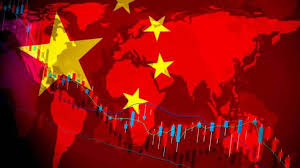
Global companies, from burger chains to car manufacturers, are increasingly grappling with a sluggish recovery in China's economy, which is the world's second-largest. The downturn in the property market and high levels of job insecurity have stunted the fragile recovery, causing ripple effects globally. Major brands such as Starbucks, General Motors, and technology firms affected by export restrictions have expressed concerns over the weak market conditions in China.
General Motors CEO Mary Barra highlighted the challenging business environment, noting that the company's division in China has shifted from generating profit to becoming a financial burden. This sentiment echoes across industries as China’s $18.6 trillion economy grew slower than expected in the second quarter. The cautious approach of households, who are prioritizing savings and debt repayment, has led to retail sales growth sinking to an 18-month low in June.
Despite the Chinese government's efforts to stimulate consumption through measures like supporting equipment upgrades and consumer goods trade-ins, these initiatives have yet to alleviate concerns. Analysts suggest that without a significant structural shift to boost consumer spending, China could face a prolonged period of economic stagnation and deflation.
Apple experienced a steeper-than-expected 6.5% decline in sales in China, a market that constitutes a fifth of its revenue. Similarly, French cosmetics giant L'Oreal projected a slight decline in the Chinese beauty market into the latter half of 2024. The impact extends to other consumer giants like Starbucks, McDonald's, and Procter & Gamble, as well as luxury goods manufacturers such as LVMH and Kering, who have reported underwhelming results.
The automotive sector is particularly affected, with foreign automakers like Tesla, BMW, Audi, and Mercedes embroiled in a price war against domestic electric vehicle makers, led by BYD, which offer technologically advanced yet affordable models. The MSCI World with China Exposure Index, which tracks companies with significant revenue from China, has risen 11.6% this year, mainly due to gains in semiconductor stocks driven by AI demand. However, mounting U.S.-China trade tensions and domestic Chinese policies have further complicated the landscape for multinational companies.
Beijing's anti-corruption campaign has disrupted operations, affecting companies like GE HealthCare and Merck. Meanwhile, tighter U.S. export curbs on high-end chip technology have impacted semiconductor sales in one of the largest markets. Qualcomm, for instance, reported a revenue hit due to these restrictions, despite a generally positive forecast.
Stuart Cole, chief macroeconomist at Equiti Capital, remarked on the unexpected duration of China's economic slowdown, noting that the anticipated rapid recovery post-Covid restrictions has not materialized. As a result, the robust economic expansion previously seen in China is unlikely to return in the near future.
(Source:wwww.reuters.com)
General Motors CEO Mary Barra highlighted the challenging business environment, noting that the company's division in China has shifted from generating profit to becoming a financial burden. This sentiment echoes across industries as China’s $18.6 trillion economy grew slower than expected in the second quarter. The cautious approach of households, who are prioritizing savings and debt repayment, has led to retail sales growth sinking to an 18-month low in June.
Despite the Chinese government's efforts to stimulate consumption through measures like supporting equipment upgrades and consumer goods trade-ins, these initiatives have yet to alleviate concerns. Analysts suggest that without a significant structural shift to boost consumer spending, China could face a prolonged period of economic stagnation and deflation.
Apple experienced a steeper-than-expected 6.5% decline in sales in China, a market that constitutes a fifth of its revenue. Similarly, French cosmetics giant L'Oreal projected a slight decline in the Chinese beauty market into the latter half of 2024. The impact extends to other consumer giants like Starbucks, McDonald's, and Procter & Gamble, as well as luxury goods manufacturers such as LVMH and Kering, who have reported underwhelming results.
The automotive sector is particularly affected, with foreign automakers like Tesla, BMW, Audi, and Mercedes embroiled in a price war against domestic electric vehicle makers, led by BYD, which offer technologically advanced yet affordable models. The MSCI World with China Exposure Index, which tracks companies with significant revenue from China, has risen 11.6% this year, mainly due to gains in semiconductor stocks driven by AI demand. However, mounting U.S.-China trade tensions and domestic Chinese policies have further complicated the landscape for multinational companies.
Beijing's anti-corruption campaign has disrupted operations, affecting companies like GE HealthCare and Merck. Meanwhile, tighter U.S. export curbs on high-end chip technology have impacted semiconductor sales in one of the largest markets. Qualcomm, for instance, reported a revenue hit due to these restrictions, despite a generally positive forecast.
Stuart Cole, chief macroeconomist at Equiti Capital, remarked on the unexpected duration of China's economic slowdown, noting that the anticipated rapid recovery post-Covid restrictions has not materialized. As a result, the robust economic expansion previously seen in China is unlikely to return in the near future.
(Source:wwww.reuters.com)





